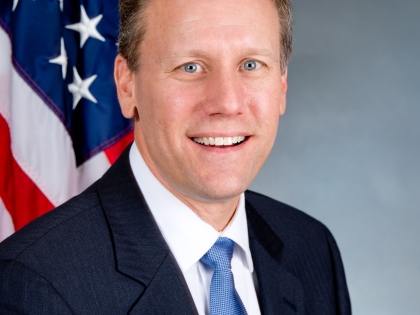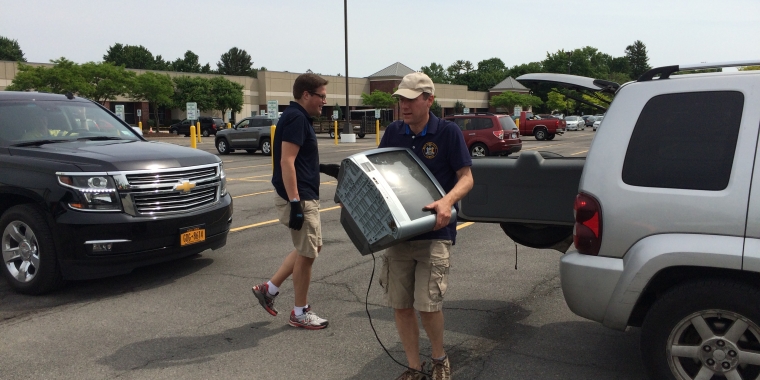
Why Syracuse should care about who controls the New York Senate
By Teri Weaver on October 20, 2014 at 6:50 AM, updated October 20, 2014 at 6:56 AM
SYRACUSE, N.Y. - The state's Republican Party is in a fight for its life to keep control of its last source of power in state government: The New York State Senate.
Central New York voters will have no say in the matter. The region's six senators are all unopposed.
That means voters in a handful of districts near Buffalo and Albany and across the Hudson Valley likely will decide whether the Republicans retain control of the Senate - or whether two Democratic factions will join forces to control the chamber and put the entire New York State Legislature into the party's hands.
And that shift would affect Central New York greatly.
First, a Democratic-controlled Senate would tip political power decidedly toward Downstate. There are 63 Senate seats in New York. Only eight Democratic senators currently represent Upstate districts, and three of those are one-term incumbents facing tough re-election battles in a non-presidential year.
Second, a flip in Senate control could alter the influence Syracuse's two senators now wield as members of the chamber's current majority coalition.
That's why Sens. David Valesky, D-Oneida, and John DeFrancisco, R-Syracuse, have been following these races closely, even conferring with each other in DeFrancisco's Syracuse office over how various candidates are doing.
"We talk about it all the time," DeFrancisco said. He said the two have discussed individual races and, in a meeting earlier this month, generally agreed on analyses in key races to that point.
Both senators also agree no one knows where Valesky's Independent Democratic Conference will end up after Nov. 4 - standing alone, siding with other Senate Democrats or recommitting to another partnership with the Republican Senate.
"It's like businessmen, giving to both sides of the campaign to hedge their bets," DeFrancisco said. "Everybody is trying to court as many people as they can."
Valesky, D-Oneida, is part of a five-member group now running the Senate with Republicans. If the GOP can't win a majority on its own, the IDC will once again be in a position to pick sides and jointly run the Senate with either side.
The IDC pledged this summer to partner with fellow Democrats to recapture the majority. But Albany watchers agree with DeFrancisco and Valesky that the final outcome of the Senate remains unclear.
"Nothing is certain," said Steven Greenberg, a pollster for Siena College, said this week of the IDC's role in deciding Senate control. "Nothing is written in stone."
For now, two near-certainties are emerging two weeks before Election Day. The Republicans are positioned to win 32 seats, or more, and the majority. The Democrats - without Valesky's IDC - are not.
The pledge
Last summer, under pressure from the left wing of the Democratic Party and Gov. Andrew Cuomo, the IDC pledged to partner with the Senate's other Democrats.
"All IDC members are united and agree to work together to form a new majority coalition between the Independent Democratic Conference and the Senate Democratic Conference after the November elections," said Sen. Jeffrey Klein, D-Bronx, the leader of the IDC, in a June 25 statement that shared Cuomo's letterhead.
Valesky said this month the IDC stands behind that pledge - as long as that partnership means the two Democratic factions have enough seats to control the Senate. But he also said there's no guarantee the IDC won't end up in another partnership with the Republicans.
"I can't rule anything out," Valesky said when asked about another coalition between the IDC and the GOP senators. "And I certainly can't rule that or any other possibility out," he added. "I think it would be presumptuous for me or anyone else to rule out anything at this point in time, before an election takes place."
That careful language could end up angering some Democrats in Central New York.
"He is trying to cover all his bases and not commit and I think that's a real step back," said Joan Mandle, the executive director of Democracy Matters, a group that pushed the IDC to reconnect with the other Democrats in the Senate. "I think it's very opportunistic."
David Kirby chairs the Democrats in Syracuse's powerful 17th Ward, a key part of Valesky's district. Kirby isn't worried about the pledge. He wants Valesky and the IDC to figure out the best way to represent their districts.
What if that means aligning with the Republicans to stay in the majority? "More power to him," Kirby said.
Valesky, for his part, doesn't fear any backlash from his district about the outcome. "In fact," he said, "if my political decisions as it relates to the Independent Democratic Conference were ruled by fear, then I wouldn't be a part of the conference in the first place."


